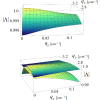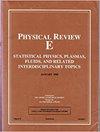向列液晶中的动态柔电不稳定性
IF 2.4
3区 物理与天体物理
Q1 Mathematics
引用次数: 0
摘要
液晶中的电流体力学现象是一个古老但仍然非常活跃的研究领域。原因是这些现象在液晶的各种应用中发挥着关键作用,而且物理界对失衡系统普遍感兴趣。向列液晶(NLC)是此类研究的理想代表。我们的文章旨在从理论上研究线性 NLCs 动态。我们将取向弹性能、流体力学运动、外部交变电场、电导率和柔电极化纳入了考虑范围。我们分析了 NLC 薄膜的线性稳定性,确定了相对于 NLC 均匀初始状态的扰动动力学。为此,我们计算了外部交变电场周期的演化矩阵特征值。这些特征值决定了该周期内各模式的放大系数。当演化矩阵的主特征值的绝对值变为 1 时,不稳定性就会发生。这一条件决定了均匀状态不稳定的临界值(临界场)。事实证明,我们可能会遇到各种类型的不稳定性,而这些不稳定性只在文献中得到了部分了解和研究。特别是,我们发现挠电不稳定性可能会导致二维空间调制模式出现时间振荡。这种类型的结构在之前的研究中被忽略了。我们提出了实现这一设想所需的条件。我们希望我们的工作成果能为进一步的广泛研究打开一扇大门。尤其重要的是全面了解各种材料参数和非线性效应的作用,这是合理设计 NLC 的关键步骤,NLC 将展现本论文中预测的多维时间振荡模式。本文章由计算机程序翻译,如有差异,请以英文原文为准。

Dynamic flexoelectric instabilities in nematic liquid crystals
Electrohydrodynamic phenomena in liquid crystals constitute an old but still very active research area. The reason is that these phenomena play the key role in various applications of liquid crystals and due to the general interest of the physical community in out-of-equilibrium systems. Nematic liquid crystals (NLCs) are ideally representative for such investigations. Our article aims to study theoretically the linear NLCs dynamics. We include into consideration orientation elastic energy, hydrodynamic motion, external alternating electric field, electric conductivity, and flexoelectric polarization. We analyze the linear stability of the NLC film, determining dynamics of perturbations with respect to the homogeneous initial state of the NLC. For the purpose we compute eigenvalues of the evolution matrix for a period of the external alternating electric field. These eigenvalues determine the amplification factors for the modes during the period. The instability occurs when the principal eigenvalue of the evolution matrix becomes unity by its absolute value. The condition determines the threshold (critical field) for the instability of the uniform state. It turns out that one might expect various types of the instability, only partially known and investigated in the literature. Particularly, we find that the flexoelectric instability may lead to two-dimensionally space-modulated patterns exhibiting time oscillations. This type of the structures was somehow overlooked in the previous works. We formulate conditions needed for the scenario to be realized. We hope that the results of our work will open the door to a broad range of further studies. Of especial importance would be a comprehensive understanding of the role of various material parameters and nonlinear effects which is a key step for the rational design of NLCs exhibiting the predicted in this publication multidimensional oscillating in time patterns.
求助全文
通过发布文献求助,成功后即可免费获取论文全文。
去求助
来源期刊

Physical review. E
物理-物理:流体与等离子体
CiteScore
4.60
自引率
16.70%
发文量
0
审稿时长
3.3 months
期刊介绍:
Physical Review E (PRE), broad and interdisciplinary in scope, focuses on collective phenomena of many-body systems, with statistical physics and nonlinear dynamics as the central themes of the journal. Physical Review E publishes recent developments in biological and soft matter physics including granular materials, colloids, complex fluids, liquid crystals, and polymers. The journal covers fluid dynamics and plasma physics and includes sections on computational and interdisciplinary physics, for example, complex networks.
 求助内容:
求助内容: 应助结果提醒方式:
应助结果提醒方式:


